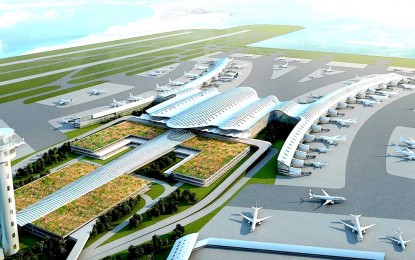
New Manila International Airport, also known as Bulacan International Airport (Photo courtesy of SMC)
MANILA – The construction of a 2,500-hectare international airport in Bulakan, Bulacan will proceed even after President Ferdinand “Bongbong” Marcos Jr. vetoed a measure establishing an adjacent special economic zone and freeport.
Press Secretary Trixie Cruz-Angeles explained in a statement on Sunday that the construction of the New Manila International Airport (NMIA), also known as Bulacan International Airport, will push through because Congress has granted San Miguel Corporation (SMC) a franchise for the construction.
“The construction of the Bulacan international airport and aero city is not affected by the veto. The presidential veto was meant to include the necessary corrections and include the missing processes that might render HB (House Bill) 7575 entirely unconstitutional,” Cruz-Angeles said in a press release.
Cruz-Angeles maintained that Marcos fully supports the creation of the Bulacan Airport City Special Economic Zone and Freeport Authority (BACSEZFA) but his decision to veto HB 7575 was meant to “cure the defects found in the measure”.
In his two-page veto message dated July 1 and released the following day, Marcos said the bill "lacks coherence with existing laws, rules, and regulations", noting that it has no provisions for an audit by the Commission on Audit (COA), procedures for expropriation of lands awarded to agrarian reform beneficiaries, and a master plan for the specific boundaries of the economic zone.
“Presidential veto is the fastest way to cure the defects of HB 7575, especially the provision which exempts the Commission on Audit to look into the financial transactions on the special economic zone and freeport. Had the President not vetoed the HB 7575, it would have lapsed into law on July 4 or 30 days after the bill was sent by the legislature to Malacañang,” Cruz-Angeles said.
She noted that all financial transactions in government are audited by COA and the proposed BACSEZFA should be of no exception.
“Without those necessary amendments indicated in the veto explanation, the law may be vulnerable to constitutional challenge. The delegation of rule-making power on environmental laws which is unique to the special economic zone is of particular concern,” she added.
Citing Marcos’ veto message, she explained that the bill did not provide procedures for expropriation of lands awarded to agrarian reform beneficiaries and granted “blanket powers” to the economic zone authority to handle technical airport operations, which would violate aeronautical laws.
The proposed economic zone is also located "in close proximity" to the Clark Special Economic Zone in Pampanga which runs against government policy on creating special economic zones in strategic locations.
BACSEZFA was described by SMC as a “major boost to both national and local economies” as it will complement the PHP740-billion airport project.
Under its conceptual master plan, the NMIA will feature four parallel runways, world-class terminal, and a modern and interlinked infrastructure network that includes expressways and railways.
SMC president and chief executive officer Ramon S. Ang earlier said the airport's construction and operations will bring inclusive growth to the province post-pandemic.
The project was proposed by SMC as a build-operate-transfer scheme under a 50-year concession. (PNA)
